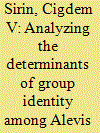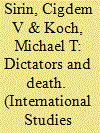| Srl | Item |
| 1 |
ID:
120749


|
|
|
|
|
| Publication |
2013.
|
| Summary/Abstract |
This study systematically explores the factors that affect collective identity associations within the Alevi community in Turkey by employing the social identity approach and examining survey data collected through fieldwork. The results show that Kurdish Alevis express lower levels of attachment to their religious identity as compared to Turkish Alevis. The results also indicate that personal experiences of discrimination tend to increase one's prioritization of Alevi identity. Last, no significant differences are observed regarding group identity between Alevis who reside in urban areas and those who live in rural areas.
|
|
|
|
|
|
|
|
|
|
|
|
|
|
|
|
| 2 |
ID:
146161


|
|
|
|
|
| Summary/Abstract |
Why are some authoritarian regimes so quick to surrender amid lower numbers of casualties while others prove willing to incur significant casualty counts to continue their war efforts? In this study, we explore the propensity of different authoritarian regime types to sustain casualties in interstate conflicts. We argue that authoritarian leaders with smaller winning coalitions find it easier to distribute the costs of militarized conflicts outside of those coalitions. This diminishes their sensitivity to casualties. Applying a theoretical model based on an inverse divide-the-dollar game (with respect to the distribution of public “bads”), we find that personalist regimes tend to sustain the highest number of casualties in militarized interstate disputes when compared to other autocracies. Our findings suggest that along with the audience cost abilities of an autocratic adversary, target states should also consider an autocratic regime's casualty sensitivity in deciding whether to reciprocate with military action.
|
|
|
|
|
|
|
|
|
|
|
|
|
|
|
|
| 3 |
ID:
125110


|
|
|
|
|
| Publication |
2013.
|
| Summary/Abstract |
In recent years, a growing body of research has set out to examine the role that emotions play in shaping political attitudes and behaviors regarding terrorism. However, one major issue that is generally overlooked is whether the thematic relevance of emotive triggers leads to differential effects on people's reactions to international terrorism. Specifically, does anger-regardless of its source-tend to drive people towards supporting an aggressive foreign policy option to counter terrorism, or do the thematic underpinnings of anger (i.e., the specific contents that trigger this particular emotion, such as watching a news story about a recent terrorist attack) matter vis-à-vis the policy choice? To address this gap, this study experimentally examines the impact of anger-induced by thematically relevant versus irrelevant emotive triggers-on people's cognitive processing and foreign policy preferences regarding international terrorism. Overall, we find that the induction of anger via thematically relevant emotive triggers leads to a higher tendency for selecting a military option, a lower amount of information acquisition, and a shorter processing time in response to terror-related incidents.
|
|
|
|
|
|
|
|
|
|
|
|
|
|
|
|
| 4 |
ID:
112373


|
|
|
|
|
| Publication |
2012.
|
| Summary/Abstract |
This study examines the effect of political information levels and intervention stages on the formation and continuity of public support for military interventions by analyzing survey data pertaining to the 2003 military intervention in Iraq. The results show that before and immediately after the launch of the intervention, politically uninformed individuals expressed higher support for the war compared to politically informed ones. However, as the intervention proceeded and casualties were incurred, higher rates of decrease in support were observed among the politically uninformed. Politically informed individuals, on the other hand, demonstrated more stable levels of support throughout the course of the intervention.
|
|
|
|
|
|
|
|
|
|
|
|
|
|
|
|